Rainbow over Brighton: Why LGBT still feel discriminated in the Russian neighborhood
Brighton Beach is a legendary neighborhood in New York City, a “little Odesa,” an old oasis of Russian immigration. It’s a place longed for by many Russian hearts; when they choose where to live in a foreign country, many natives of former USSR countries struggle to settle among “their own tribe,” hear their mother tongue, and never feel that the huge and alien America lies beyond the invisible borders of the Russian-speaking neighborhood. However, many are deprived of the community’s helping hand, or even mistreated by it: some of new arrivals (Russians and not really) in Brighton and its larger area belong to LGBT minorities. It often happens they are forced to move to the United States over discrimination and persecution at home. However, even across the ocean, in Brighton, they end up still being “at home” over facing aggression and incomprehension almost everywhere here. ForumDaily looks into how LGBT community of Brighton Beach gets along with its Russian speaking residents.
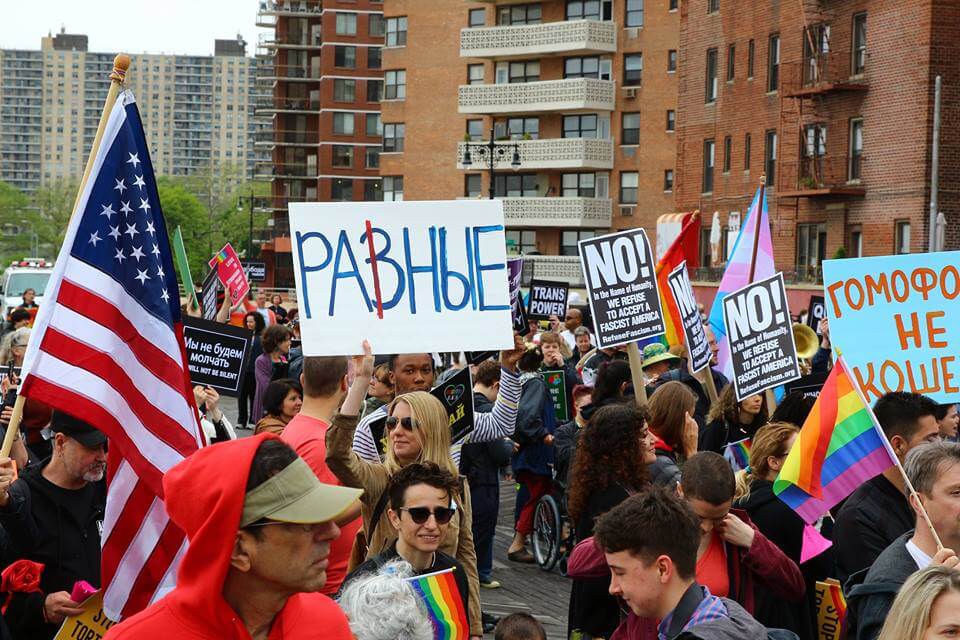
Brighton Beach Pride in May 2017. Photos by Nikita Burukhin
Risking your life at work
Dima and Misha moved to New York City from St. Petersburg in February 2017, fleeing from police brutality: instead of protecting them from homophobes, the police threatened to jail the couple. Dima was forced to work in a store at Kings Highway, with the majority of customers hailing from CIS countries. In the store, he faced unpleasing outcomes of working in the “Russian neighborhood.”
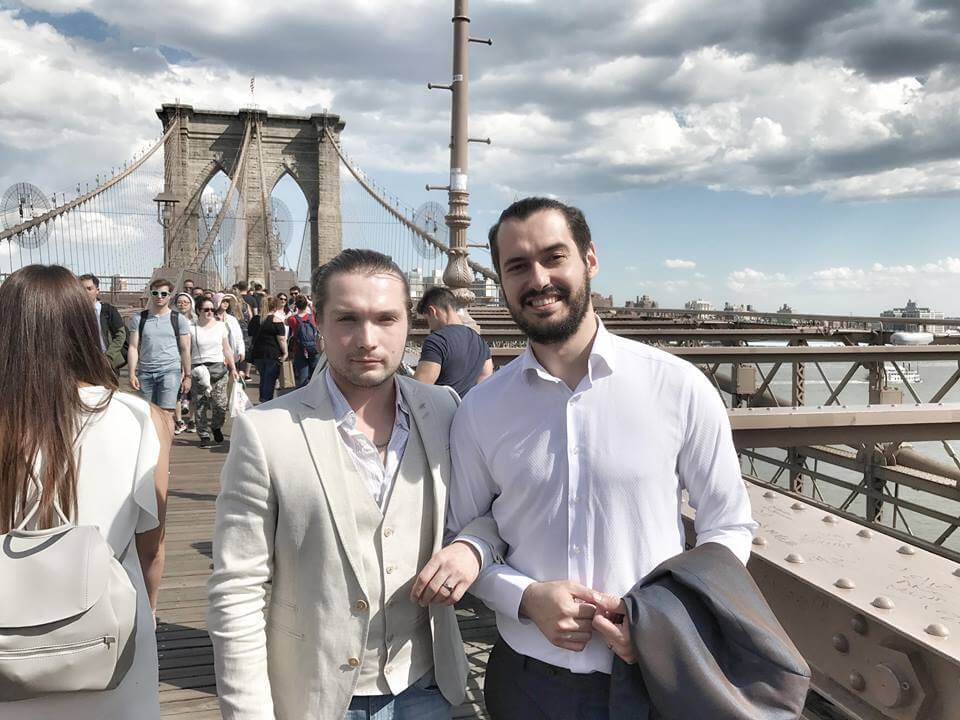
Photo from personal archive
“One evening, a family entered our store — a woman, a man, and two kids. Store manager, my friend who is open gay, was smoking at the store entrance and was about to close it,” Dmitry says. “The woman saw him smoking and rudely asked him to leave. Certainly, he couldn’t go away, so he said the store was about to close and asked the family to leave the private property. However, the woman kept insisting that he put out his cigarette and left the store. Her companion got into the broil and started dabbing my friend with fingers and raising his voice at him. I lost my patience and we all got into a brawl. We were immediately dubbed “fagg#ts” and “shit-#sses.” We knew what to do and played along, knowing that the store had many recording surveillance cameras in it. We turned a well-known song “I will survive” and called the police, and while we were waiting, we pretended we were having fun just like gay people should — right in front of them. They kept offending us even after leaving the store and standing at a bus stop opposite it. Eventually, the man approached me and started strangling. Of course, the camera recorded it, and when police arrived, he was taken to the precinct… My friend resigned in two days, and I followed, promising myself to never again take this risk and look for job in a Russian-speaking neighborhood.”
Dmitry believes most of those who move to the United States from former USSR countries take their biases and fixations with them. “It’s not that they don’t know that the U.S. allowed same-sex marriages several years ago — they just find open demonstration of one’s orientation dirty and indecent,” he says.
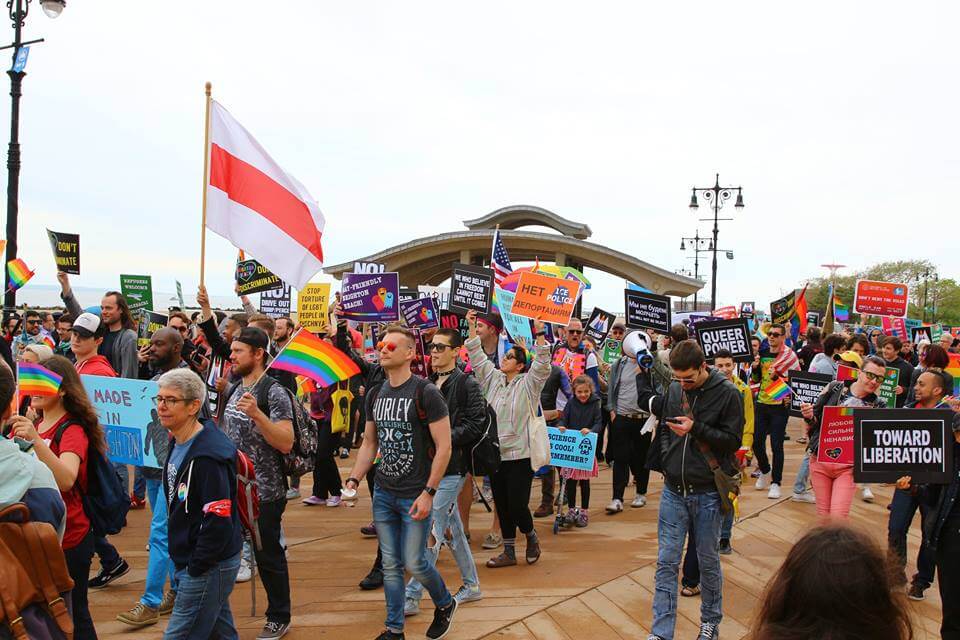
Brighton Beach Pride in May 2017. Photos by Nikita Burukhin
He says the difference in how Russian-speaking population in the U.S. and Americans see the LGBT community is huge. “I took part in the annual gay parade in New York City this year as a marshal, a group leader,” Dmitry says. “I was supervising order and security of our Russian-speaking column, and there wasn’t a single negative shout or disdain look from the public. Many asked to approach them and give a hug; they cheered when they saw the column from CIS countries.”
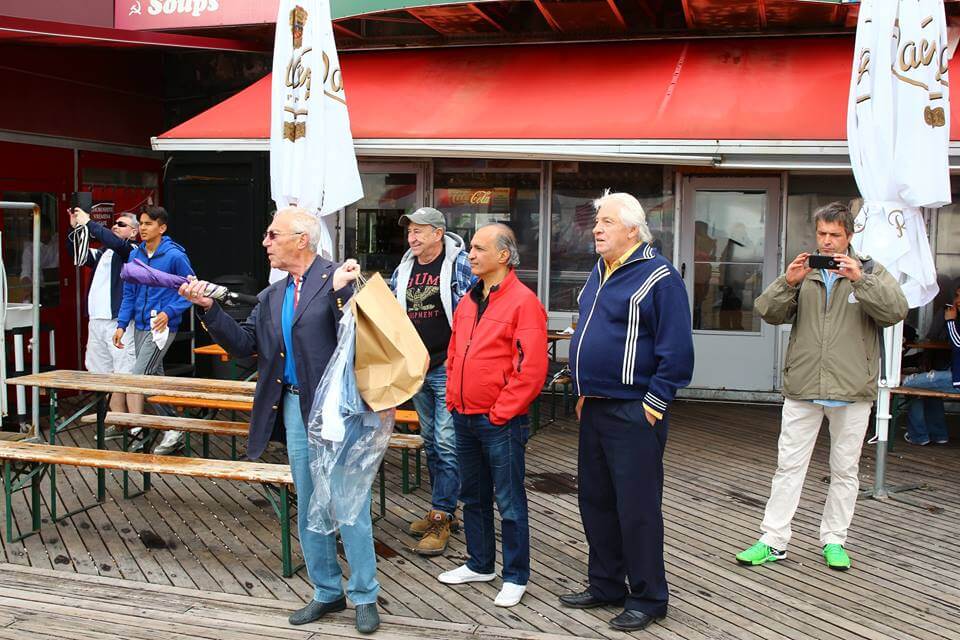
Observers’ reaction to Brighton Beach Pride in May 2017. Photos by Nikita Burukhin
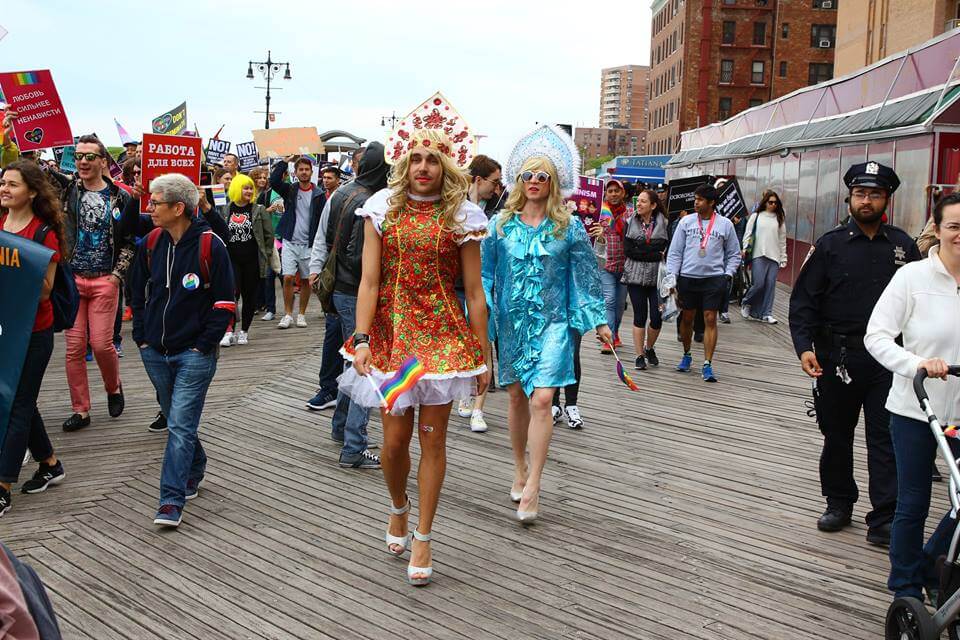
Brighton Beach Pride in May 2017. Photos by Nikita Burukhin
American Dream of living without fear
Tolerance is one of the key difference of the United States compared to former Soviet countries. The First Amendment provides for the right to choose what to believe in, what to say, and what to think. The right to love differently has emanated naturally from it — the U.S. has long been considered one of the flagships of queer culture. Harvey Milk was born here, Stonewall riots took place here; gay and lesbian studies have been initiated in the U.S. universities — i.e. the studies of history, origins, and the purpose of the LGBT movement. The land of freedom is not just a name for gays, lesbians, bisexuals and transgender people from post-Soviet area. They all leave for America in search of legal protection and life without fear.
23-year-old Kirill (name has been changed for privacy purposes) is one of them. Kirill arrived in the U.S. in late 2016. He settled down in New York City but tries to avoid visiting Russian-speaking neighborhoods.
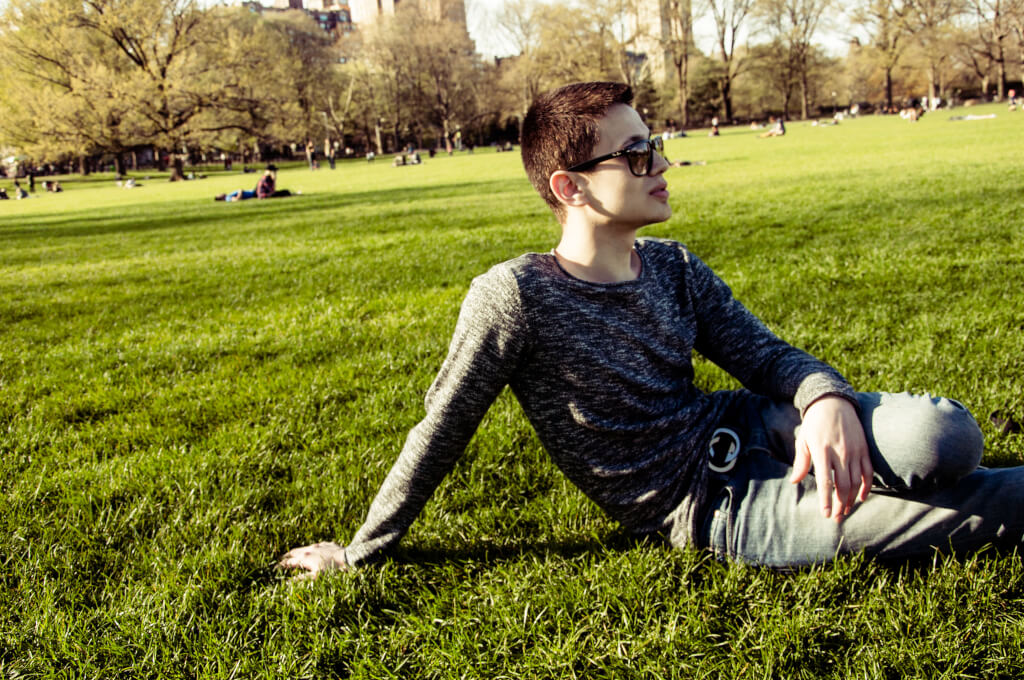
Photo from personal archive
“As a gay, I avoid this place!” Kirill says of Brighton Beach. “I steer clear from it just like the devil from the holy water. I fled exactly from this in Russia, why would I need to get into this hell again? Brighton is a negative, unpleasing, intolerant and unfriendly place… That would be enough to say. But on the other hand, its residents are kind of interesting for me. Why would people immigrate to a different country and never want to assimilate, taste new culture, traditions, and leisure?”
Although Kirill never shows up at Brighton, the neighborhood ‘showed up’ at his place anyway. In NYC subway Q line, the bottom of which runs through ‘Russian areas,’ the man saw a couple who were criticizing two gays standing next to them, out loud in Russian.
“They started commenting on how the gays should act, what they should do, how they should be dressed, where they should go, burn, and hang,” Kirill says. He decided to take his mirror and doll up on purpose. He heard an offensive comment about himself as well, and responded to the couple in Russian what he thinks about them. During the next two stops they were exchanging courtesies — Kirill learned that he would “burn in hell” and should “go to church,” along with regular gay offenses.
22-year-old Stepan N. fled from the Ural in Russia over homophobia and asked for political asylum in the United States. He’s been living in NYC for year and a half now, and does not conceal his sexual orientation to his acquaintances or employers. Stepan had a chance to meet his compatriots here: his first job was in a Russian-speaking company. In addition, you cannot just completely avoid communicating with Russian community when you arrive in the U.S. being unable to work legally, without connections, and without money — you are just an asylum seeker who will receive his residence documents only a year after arrival or even more due to specific migration laws.
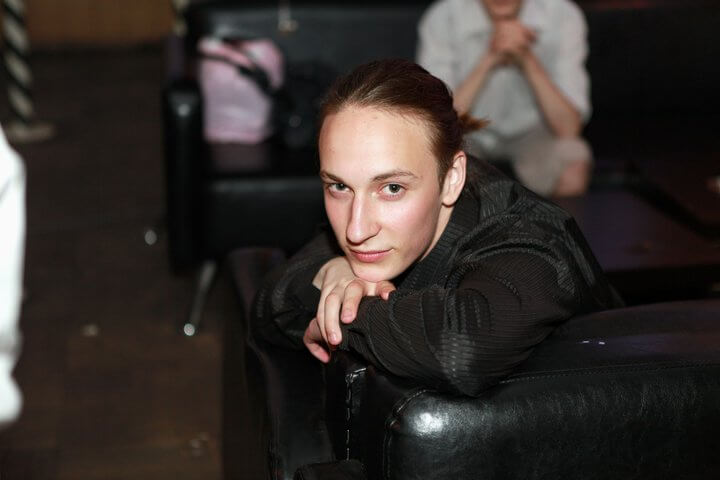
Photo from personal archive
Stepan has faced numerous attacks that might seem soft but in fact have deep impact upon the state of mind of a person who had suffered many years of mockery and humiliation in his home country.
“I used to work as a packager in an online selling company. There, I faced colleagues’ jokes about ‘fagg#ts’ so I had to leave,” he says.
At the same time, Stepan realizes these situations cannot be eliminated completely from communication with Russian-speaking community.
“Unfortunately, many people who leave Russia and former CIS countries have the same mindset here; they don’t want to adapt, to become more tolerant and more open to the society. These people live in their own small closed world,” he says.
Stepan is regularly involved in “clashes” with Russian neighborhoods that end badly for him. Even a walk might turn a disaster. “I was walking once alongside the boardwalk at Brighton with a young man, we were holding hands,” Stepan says. “We heard some people shouting “Fagg#ots! Look, the fagg#ots there!” But no one approached us personally.”
Russian-speaking LGBT people feel like “at home among strangers” in New York City. As a rule, every newcomer immigrant instinctively would search protection and support inside his community. But gay immigrants do not feel the same. After they move to the U.S., they prefer to hide away from Russian-speaking communities. “Our clients do not know we are a couple,” two gay people working in a small business say. “They don’t need to know. For most of them are Russians.”
Discrimination, lack of understanding, bullying — this is what Russian-speaking immigrants in the U.S. face most of the time. Russian diaspora is not welcoming to mavericks, and any case of silo mentality can become absolute within a closed community. It was extremely difficult to get people to comment for this article — most of those who are featured here, including prominent activists of the community, were voicing various reasons not to comment. It’s easy to understand: being openly dismissive about the Russian-speaking community might mean losing their regular income or a lease of a good apartment, and for some even losing their friends (who do not know about their pal’s sexual orientation or prefer not to discuss it). Russians bring intolerance, conservatism and homophobia with themselves from across the ocean, and it often happens that these feelings stay with them for good. And LGBT newcomers are forced to adapt to these sentiments because they often don’t have a choice. Who else will let them an apartment without credit history and legal income? Who else with hire them without English speaking skills? Of course, only Russian area residents will: Brighton Beach and neighboring Sheepshead Bay, Coney Island, Bensonhurst.
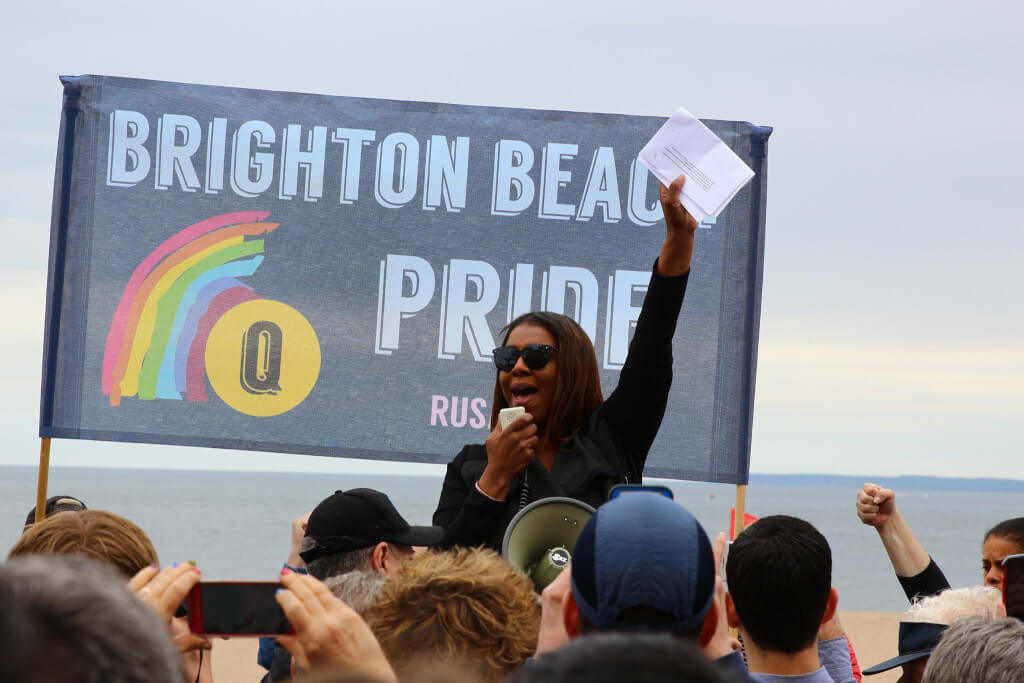
Brighton Beach Pride in May 2017. Photos by Nikita Burukhin
The prominent Brighton Beach Pride
The prominent Brighton Beach Pride that took place in May 2017 was next to a sensation. Although prides are held regularly in New York City (the major one held in June, and many smaller ones in separate areas), it is still a bad idea to hold them in ethnical homophobic communities. Everyone knows there are numerous neighborhoods in NYC were “no gays are allowed,” and they just shy away from that. And Brighton has long been deemed a veto territory.
Still, on May 20, 2017, rainbow flags were flown over amazed Brighton Beach for the first time as Russian-speaking gay pride walked along the ocean edge followed by gawkers, camera flashes, and drizzle. “This is our city! We are queer, we are here!” the attendees shouted. Some slogans were funny, like the one reading in Russian “Everyone will get their sausage.” It refers to a well-known term “sausage immigration,” i.e. the last emigration wave from the USSR and the first one from Russia, which arrived in the U.S. in the 1990s. The “sausage immigrants” are today the major group in the Russian-speaking community, and these people, whose views have been already shaped and whose kids grow up to be “real Americans,” were the key target audience of the pride.
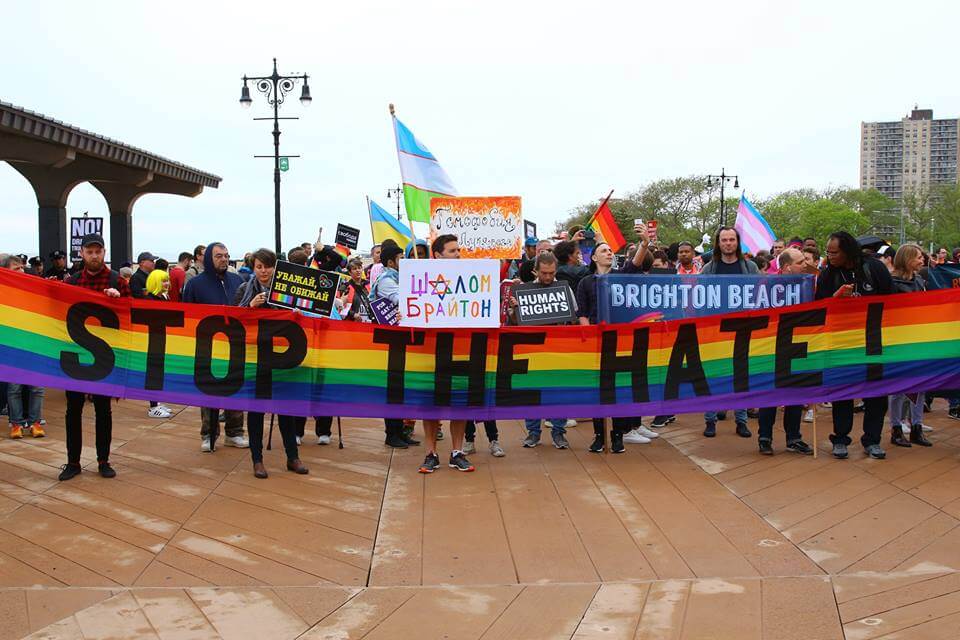
Brighton Beach Pride in May 2017. Photos by Nikita Burukhin
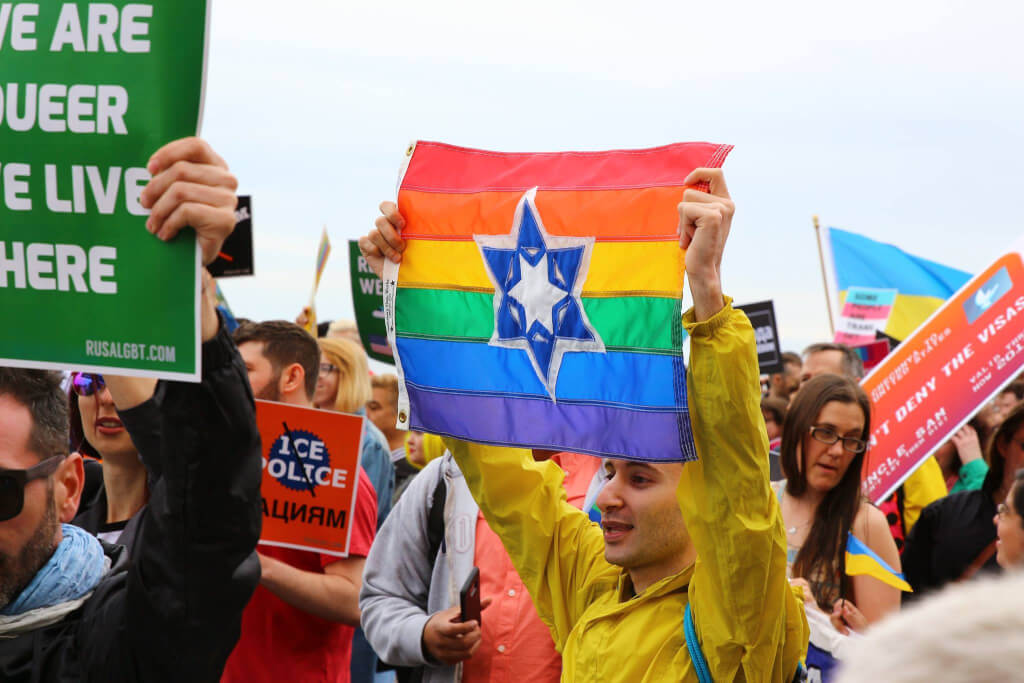
Brighton Beach Pride in May 2017. Photos by Nikita Burukhin
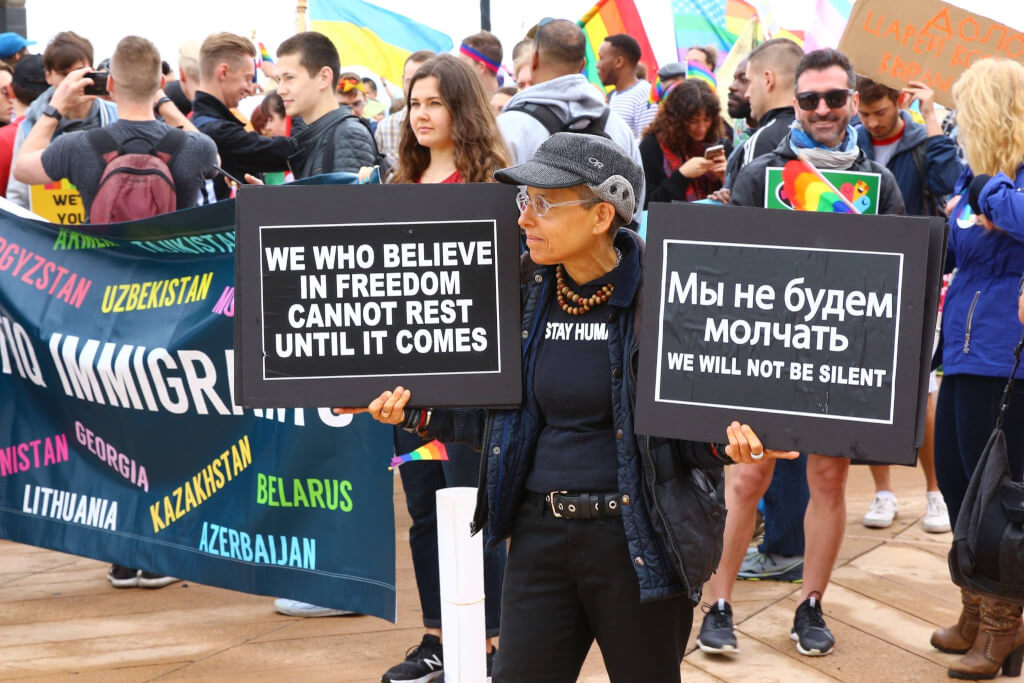
Brighton Beach Pride in May 2017. Photos by Nikita Burukhin
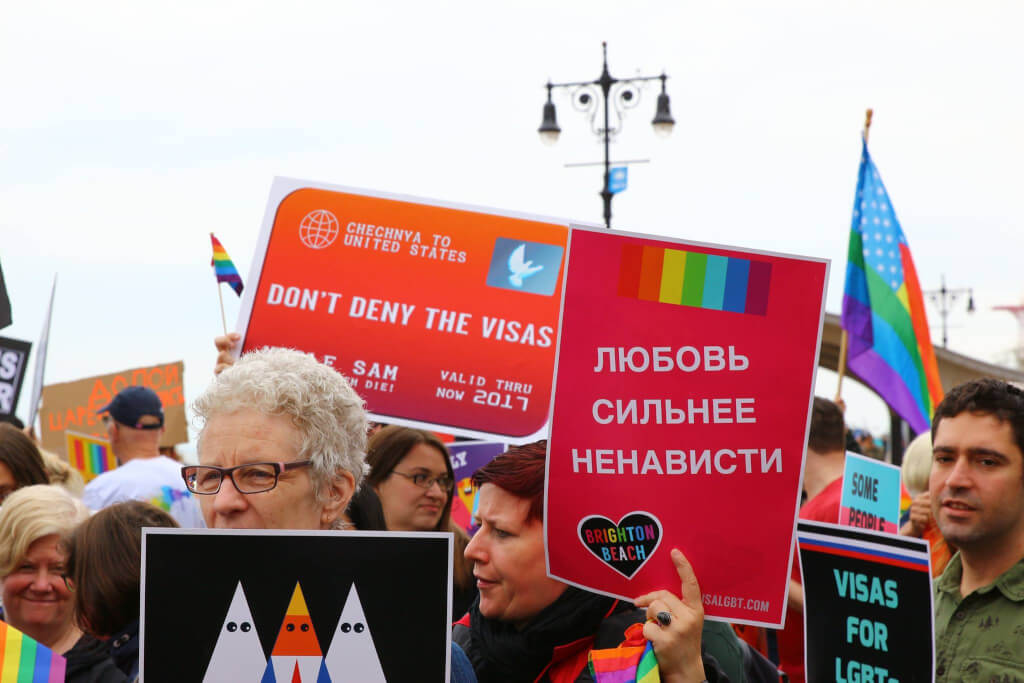
Brighton Beach Pride in May 2017. Photos by Nikita Burukhin
The idea to hold the pride exactly in Brighton was suggested by Alexey Gorshkov, a professor and co-president of RUSA LGBT, activist and public speaker. He came up with it in late 2014, and it took three years to fulfill. The reason is that most of the newcomer gay immigrants in Russian-speaking areas are still forced to hide.
“It’s not some ungrounded fear,” Gorshkov says. “The level of homophobia in these areas remains high at both verbal and sometimes physical level. I got really angry about us remaining outcasts even here among our people. I personally was insulted verbally so many times. Every time I heard some stories like… ‘my employer threatens and bullies me’ or ‘healthcare office personnel laughs at me because I’m gay’ or ‘my landlord shouts that people like me will not be allowed in his house’ my faith grew stronger. Then I started hearing stories about physical violence, and that was it. I decided we must hold the pride whatever it takes.”
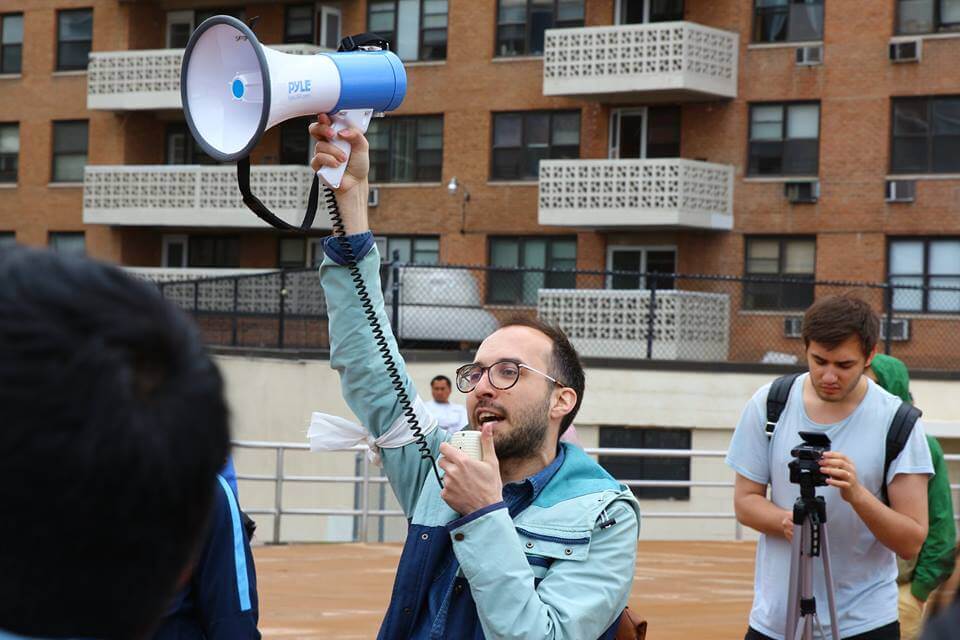
Brighton Beach Pride in May 2017. Photo by Nikita Burukhin
Brighton Beach Pride took a lot of efforts to be set up: the idea of Alexey Gorshkov was not supported right away by everyone. Most of the Russian-speaking LGBT community initially refused to participate and was extremely skeptical about it.
“I was surprised, although not too much, with the fact that the major protests came from our own LGBT, who launched a campaign on bringing down the very idea of Brighton Beach Pride to some cheap freak show… Homophobia emanated by LGBT themselves is worse than any other homophobia. They were shouting, giving us hell, and shaking the air with sarcastic exclamations like ‘Of course, you will fight homo sovieticus with feathers and sequins!’ These people are not self-assured and prevent others from normal living. It’s a tragicomic but realistic picture. It didn’t break, but inspired me. Solidarity is what Russian-speaking LGBT community lacks,” Alexey says.
Many members of the LGBT community did not initially plan to attend the Pride. They feared they would be beaten, that a disaster will occur, that police would not help. “What do you want to change?” they kept asking. Some said openly that they did not want to attend because if their acquaintances from Brighton learn they were there they would no longer want to deal with them. Some people feared losing their job… All the fears the community had and the most popular occurrences were reflected in slogans written on the placards created for the Pride. They included calls for equality at work and gay-friendly platforms as well as funny “homophobia is mischievous.”
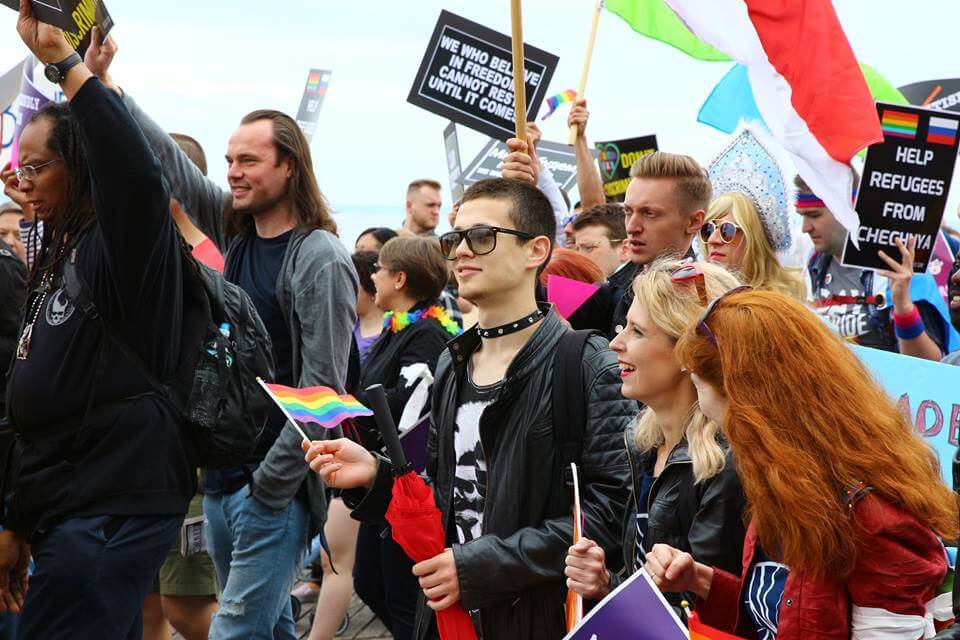
Brighton Beach Pride in May 2017. Photo by Nikita Burukhin
Kirill says he did not want to attend the pride not because of fear but because of skepticism. “I thought it was pointless to prove, explain or present ourselves to people who are so far from understanding all of it. They would not want to listen, understand, or accept… But after numerous explanations by my friends that all of this did have sense, after numerous debates about it I understood the pride had to take place. We also have the rights; we are equal, friendly, and we bring peace… “For how long will you be scared to speak up? Is it why I came over here? To be afraid again? No!” This is what it thought. So I marched in the front rows of the Pride. It was wonderful: very emotional, proud, loud, inspiring and exciting. Some reacted as we expected — with hatred and judgement, others were surprisingly friendly and supportive. Nevertheless, we did it, we fulfilled our planned mission and didn’t get scared. We held the first ever Pride in Brighton and are very proud of it!”
However, Alexey Gorshkov rationally believes that only poor weather conditions and unawareness of Brighton Beach residents prevented them from reacting more aggressively. In addition, the Pride was guarded by New York police.
“Next year it will be more serious, people know about us now,” Gorshkov says. “But we will be ready and will not give up.”
The Brighton Beach Pride outcome is rather optimistic: more than 300 attendees showed up despite bad weather, and no one was hurt! The event was covered by many media, and many people who were initially sceptic about it, still came. Special attention was caught by a group of young people wearing traditional Russian head pieces called kokoshnik: they decided to add some fun to the Pride. One of them anonymously told in an interview later that it was his first time showing up dressed like this in broad daylight.
Stepan also attended the Brighton Beach Pride. Although wearing “civil” clothes, he still marched with great joy.
“I understand that this is a place where I should not be afraid of anyone or anything. If I can change anything, I would like to do that — even if it’s about changing the way people think in Brighton Beach.
“I believe we should be communicating it as much as possible to Russian-speaking audience that we are equal, we have the same rights, and we are just different over our preferences,” Kirill says. “There’s no need to hate us or be afraid of us, try to understand us first… Homophobia is present everywhere! Including the U.S. Holding prides and marches and protests like this will make sense until we all forget the word ‘homophobia’ and until there is not a single person on the earth, of any orientation, who is afraid to be who he is, at any place on the planet.”
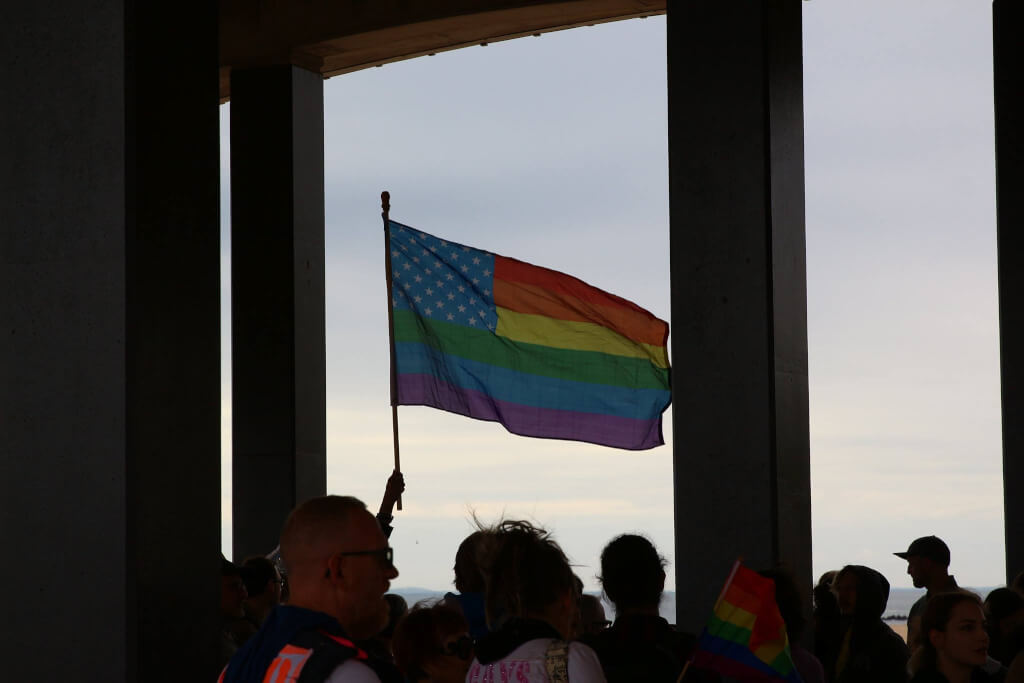
Brighton Beach Pride in May 2017. Photo by Nikita Burukhin
A different look at Brighton
Alexander Yankin, who resides in one of the most expensive areas of Manhattan, East Village, once or twice per quarter comes to Brighton in order to walk along its main street, eat pirozhki (pasties) and buy some traditional food like pelmeni (meat dumplings), buckwheat, and caviar. Alexander used to work in PR and management, but now he’s an administrator of popular group Rainbow America. He’s lived in the U.S. for two years now, and Brighton Beach, he says, is “a piece of homeland” for him.
“Many people see Brighton’s originality, its special atmosphere, even saleswomen’s rudeness in the stores not as a drawback but as a way to feel at home without leaving the U.S.,” he says. “I believe Brighton is the best ethnic area in New York, especially thanks to the beautiful boardwalk and beach. Not a single enclave boasts the same great location. In Brighton, I can speak Russian and brag in a store; when a saleswoman scolds you, it’s like ‘the music of the homeland.’ My soul rests when I’m there.”
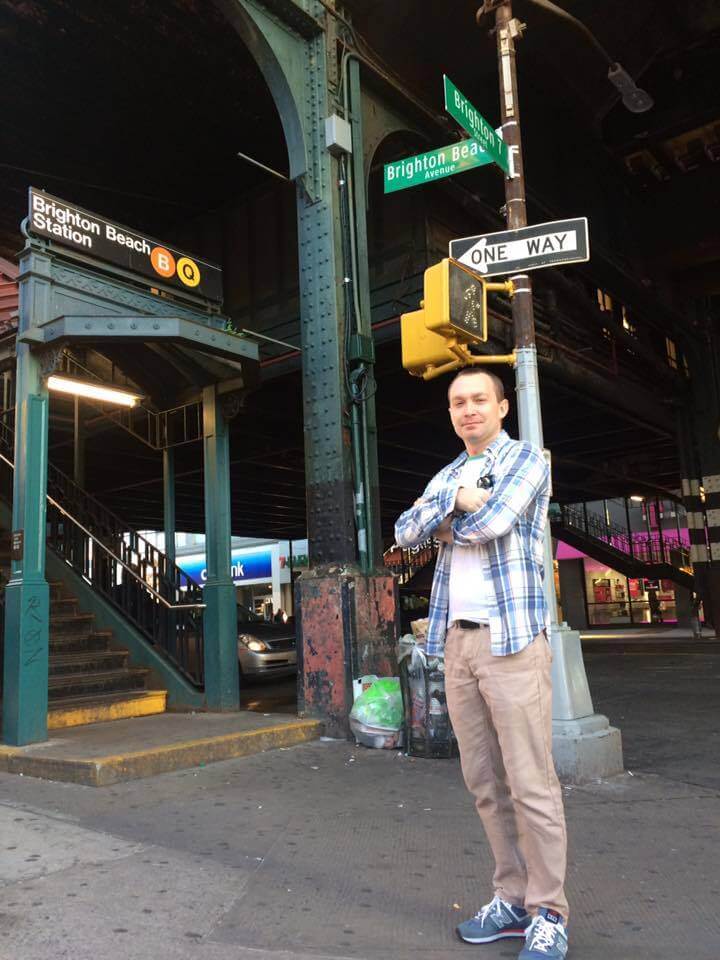
Photo from personal archive
Isn’t it time for Brighton to change? Alexander believes it’s not. Brighton is changing anyway due to time and immigration from the CIS. Alexander says he opposes radical and forced changes from outside.
“Old population of the ‘Little Odesa’ is getting old dying out,” Yankin says. “Their children are leaving for Big America. Their place is being taken by new immigrants, mostly from Asia, with their own traditions, cuisines, and cultures. ‘Little Odesa’ is slowly and surely turning into ‘Big Samarkand.’ The splendor and grandeur of the 80s and 90s have become the thing of the past.”
Unlike many others from the LGBT community, Alexander does not feel homophobia as such in Brighton.
“People are so much tired of American competition and battle for survival that they honestly don’t give a damn about problems and self-expression of other people. If it does not concern a Brighton resident directly, they will never even look at you. However, I have heard about such fights from my acquaintances. Anyway, homophobia is inherent for newcomer immigrants who still live up to traditions of their former homeland.”
Alexander’s dream is to see a Russian-speaking gay bar in Brighton. However, he doubts very much he will live to the day to see it.
Читайте также на ForumDaily:
Two friends create toys to help fighting autism
To fake or not to fake: risk assessment of buying fake documents in the US
Russian Alexey Rubin names New York City intersection after Sergei Dovlatov
Splendor and destitution of Brighton Beach: life of legendary ‘Little Odesa’
Russian-speaking gays and lesbians start over in New York
Подписывайтесь на ForumDaily в Google NewsХотите больше важных и интересных новостей о жизни в США и иммиграции в Америку? — Поддержите нас донатом! А еще подписывайтесь на нашу страницу в Facebook. Выбирайте опцию «Приоритет в показе» — и читайте нас первыми. Кроме того, не забудьте оформить подписку на наш канал в Telegram и в Instagram— там много интересного. И присоединяйтесь к тысячам читателей ForumDaily New York — там вас ждет масса интересной и позитивной информации о жизни в мегаполисе.



















